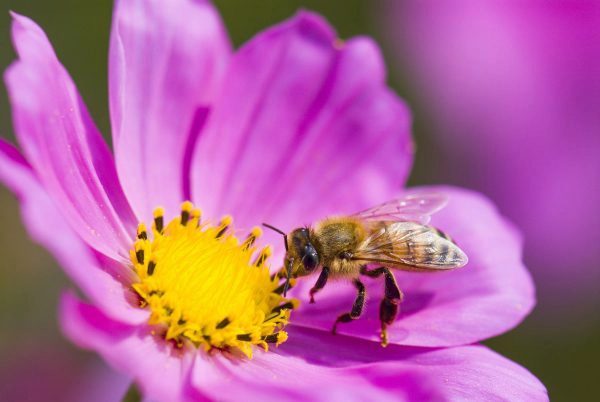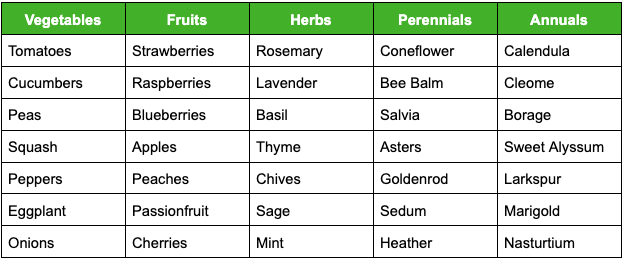
Mosquito Joe highlights National Honey Bee Day, emphasizing the importance of pollinators and how to protect them.
|
Join us in celebrating National Honey Bee Day on the third Saturday in August! Like World Honey Bee Day, every May 20th, it is an opportunity to raise awareness of the vital work done by honey bees and beekeepers. The debt we owe to the fuzzy little buzzers is about far more than the honey they make. According to the USDA, honey bees pollinate $15 billion (with a bee!) worth of crops every year. This includes over 130 types of fruits, veggies, and nuts. Without the honey bees, many of these crops would completely fail, while others would yield pitifully small harvests.
We rely on the honey bee and other pollinators for one-third of the world’s food supply. Yet pesticides, habitat loss, and invasive species pose deadly threats to all pollinators, specifically bees. These pollinators are so important to us all that Mosquito Joe® is committed to eco-friendly pest control and our Pollinator Protection Management Program.
In celebration of National Honey Bee Day, let’s plan to scatter native wildflower seeds, enjoy some locally sourced honey, share a dinner made from farmer’s market produce, maybe raise a glass of mead, post your praise of honeybees with #NationalHoneyBeeDay, and learn how to help honey bees by growing a pollinator-friendly garden.
Threats to Bee Populations: Why We Need to Save the Bees
Multiple environmental factors threaten honey bee health and their very existence. The indiscriminate use of broad-spectrum insecticides, loss of habitat, limited food sources in quantity and diversity, parasites, and disease burden the busy buzzers to the point of colony collapse. The pressures honey bees, other bees, and pollinators face are severe and growing. That’s why we need to #SaveTheBees.
We can all do our part and opt for ways to help honey bees:
- Use natural pesticide treatments from professionals dedicated to eco-friendly pest control
- Curtail the use of home pesticides and herbicides
- Plant a pollinator-friendly garden (even a single container of mixed flowering plants can help)
- Plant a flowering tree
- Never spray unwanted honey bees on your property — call your local beekeeper
- Support local beekeepers — buy locally sourced honey
- Help educate children about honey bees and the importance of pollinators
- Donate to save the honey bees programs and organizations
Let’s celebrate National Honey Bee Day by planting a pollinator-friendly garden. Your fruits and veggies will love it!
How to Create a Bee-Friendly Garden: A Haven for Pollinators
Creating a pollinator-friendly garden turns National Honey Bee Day into year-round support that benefits your garden and the bigger ecosystem. Whether planting an acre or a single container on a balcony, your efforts can make a real difference.
Grow a variety of flowering plants that attract bees.
Many flowering plants (though not all) attract honey bees. Plant a diverse selection of native wildflowers, trees, shrubs, herbs, vegetables, and fruits. Select long-blooming varieties and those with staggered bloom times to provide an ongoing source of nutrition bees need.

This table is just a starting place for choosing plants for your pollinator-friendly garden.
Allow your plants to flower.
Instead of cutting down basil, Swiss chard, or kale after harvesting, let them flower to support honey bees and other pollinators. Leave some radishes, lettuce, carrots, and onions on the ground. Their flowers are excellent for bees.
Learn to love the weeds.
Dandelions, clover, milkweed, and goldenrod are bee magnets. Allowing these weeds to flower is the easiest way to make for a more pollinator-friendly garden.
Avoid using pesticides and herbicides.
Spraying poisons all over your yard is a significant threat to all pollinators, including honey bees. Instead, pull weeds by hand and use eco-friendly pest control when possible. When pest problems get out of control, hiring the pros at Mosquito Joe for eco-friendly pest control gets rid of the problem without hurting the bees.
Mosquito Joe’s Eco-Friendly Pest Control: Supporting Pollinators and a Healthy Environment
Most people know about Mosquito Joe’s award-winning and comprehensive pest control services. But you may not know of our commitment to eco-friendly pest control practices. We fully appreciate the critical role pollinators play in every ecosystem in the communities we serve.
As proud members of the EPA’s Pesticide Environmental Stewardship Program (PESP), we provide low-risk outdoor pest control to protect you and your family from nasty biters and away from your property. We aim to empower you to enjoy your outdoor spaces free from biting and stinging pests while preserving local pollinators.
You can count on being pleased with our eco-friendly pest control services. The Neighborly Done Right Promise® and Mosquito Joe Satisfaction Guarantee backs everything we do, ensuring your satisfaction. Just contact your locally owned and operated Mosquito Joe to request a free quote.
We’ll take care of the rest.
Bee the Change: Take Action to Protect Our Pollinators
How will you celebrate National Honey Bee Day? Will you share the buzz on social media for the day? Every bit helps! Did you know that the average honey bee produces just 1/12 of a teaspoon of honey in its entire life? That’s just 0.8 grams. Yet bee hives in the U.S. typically produce from 10 to 200 pounds of honey every year!
Like the honey bees, when we each do something small, our combined efforts make a significant difference. If you’ve never tasted locally sourced honey, try it for the occasion. If you already know how great it is, commit to only buying local honey moving forward, supporting local beekeepers and their hives. If you have a yard or balcony, plant a pollinator garden.
Every one of us can make a difference. Maybe you’ll even choose to become a beekeeper. What a bee-youtiful way to celebrate National Honey Bee Day.
